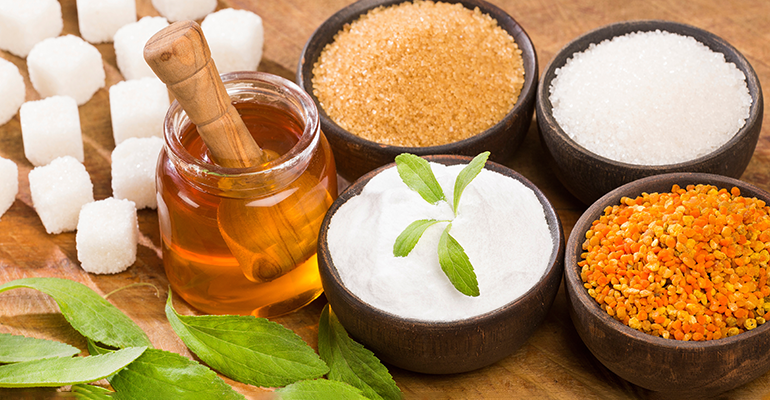News
WHO advises non-sugar sweeteners have no nutritional value
31 May 2023
The World Health Organization (WHO) has warned against using non-sugar sweeteners for weight control or lowering the risk of non-communicable diseases.
On 15 May, the World Health Organisation (WHO) published a new guideline on non-sugar sweeteners (NSS), formally recommending against their use to control body weight or reduce the risk of non-communicable diseases (NCDs).

Established in the food industry as a sugar replacement, consumers may opt for NSS over sugar as they perceive them to be healthy. Food manufacturers have therefore made the swap from sugar to sweeteners in new product developments (NPDs) to meet these needs. “NSS are not essential dietary factors and have no nutritional value,” said Francesco Branca, WHO Director for Nutrition and Food Safety, in the WHO’s press release.
Shoppers may choose NSS with the belief that they will support them with weight loss and lower the chance of developing NCDs, such as type 2 diabetes and cardiovascular diseases (CVDs). However, the evidence suggests using NSS in food products does not provide any long-term benefit in decreasing body fat in adults or children.
The results also indicate the possibility of undesirable side effects from long-term use of NSS among adults, including a rise in the likelihood of developing type 2 diabetes, cardiovascular diseases and mortality.
Conditional research
“The evidence assessed has been evaluated as low certainty by the WHO, and the recommendation is considered ‘conditional’,” says a spokesperson for the European Food Information Council (EUFIC).
Confirming this in its release, the guidance’s conditional status is in response to its findings observing that baseline characteristics of study participants and complicated patterns of NSS use might confuse the connection between NSS and disease outcomes in the evidence.
“WHO has classified the recommendation as ‘conditional’ because policy actions based on the recommendation will need to be further discussed and specifically designed to suit individual country contexts,” Dr Nina McGrath, content production area lead at EUFIC, told Ingredients Network. For example, different policy actions may be relevant for other regions or consumers from different age groups based on their levels of sweetener consumption.
“Policymakers will also need to consider this recommendation within the broader context of other public health priorities, for example, the reduction of sugar intake,” McGrath adds. As sweeteners are often used to reduce sugar intake, practical advice for consumers includes drinking mainly water for quenching thirst and choosing unsweetened foods and drinks or those containing naturally-occurring sugars such as fruit, McGrath says.
Anti-NSS media reports?
In response to the guidelines, EUFIC published an article detailing how the interpretation of WHO’s recommendation may be misleading. The guideline’s main recommendation—to avoid using non-sugar sweeteners to control body weight or reduce the risk of NCDs—is based on evidence classified as ‘low certainty’, McGrath says.
“So there is still research to be done to gather more high-quality evidence to help us understand with more certainty the potential long-term effects of sweetener use,” McGrath adds. Research in different groups of people or how this varies between individual sweeteners are examples of this.
 Pictured: Variety of sweeteners including stevia, sugar, pollen and honey | Credit: © AdobeStock/Luis Echeverri Urrea
Pictured: Variety of sweeteners including stevia, sugar, pollen and honey | Credit: © AdobeStock/Luis Echeverri Urrea
Consumers do not need to be concerned that NSS may pose a health concern, as safety is not a factor in the findings. “The WHO recommendation is specific to weight loss and NCD risk and is not related to safety,” a EUFIC spokesperson has said.
In critiquing the recommendation, EUFIC also states that “evidence shows that sweeteners may have a role in weight management in the short-term,” says the spokesperson. “The recommendation is not relevant for people who have diabetes,” the spokesperson adds.
Industry support
Voices from within the food industry have spoken out since the WHO released its guidelines. A response by the Science Media Center states that the guidance is limited by several factors, notably its conditional status and the role of NSS as a way to lower calories in the short-term, which it says, has evidence to support it as a part of short-term weight management interventions.
The British Nutrition Foundation also published a statement on the WHO’s non-sugar sweeteners guideline, and Knowledge4Policy, the EU Commission’s platform for evidence-based policymaking, provided information on Sugars and Sweeteners. In recent years, the EUFIC has explored sweeteners to progress understanding on what they are and their links to health outcomes.
Interestingly, in their review of the evidence, the WHO did not distinguish between artificial or natural sweeteners that are naturally occurring, for example, those extracted from plants, like stevia.
In its report, WHO highlighted the need for further research to examine how individual sweeteners may be linked to long-term health outcomes, as each has its chemical structure and properties and is processed differently by the body. “Whether a sweetener is artificial or naturally occurring in itself cannot tell us anything about its potential health risks or benefits,” McGrath says.
Further research provides the opportunity to develop this awareness. “The guideline also did not consider studies looking at the use of non-sugar sweeteners by patients with diabetes, so this is another area for future work,” says McGrath.
Related news

Oat Barista: Innovation for game-changing beverages
20 Nov 2025
Oat Barista is a clean label, sustainable, and innovative drink base specifically designed to create the perfect foam in one single ingredient.
Read more
How younger consumers are redefining ingredient choices and rejecting brand loyalty
18 Nov 2025
Gen Z and millennial consumers’ preferences for transparency, functionality, and purpose are “redefining the very nature of consumption itself”, says SPINS.
Read more
Hybrid formats and flexible positioning to disrupt category norms in 2026
17 Nov 2025
Trend forecasters expect food and drink to move more fluidly across occasions, functions, and formats as consumers seek versatility, novelty, and convenience.
Read more
Danone highlights digestive health as potential ‘tipping point’ for food industry
13 Nov 2025
Danone is betting on a food industry “tipping point” that will bloat the market for healthy products, particularly those related to gut health.
Read more
New UPF standard hoped to offer consumers ‘coherence and clarity’
10 Nov 2025
Ingredients companies are being urged to enter “a new era of partnership and innovation” following the launch of the industry’s first non-UPF verification scheme.
Read more
Faravelli at Fi Europe: Showcasing FARA® functional solutions for food and nutra
28 Oct 2025
At Fi Europe 2025 in Paris (stand 72M39), Faravelli showcases FARA® Customized Functional Solutions and a wide ingredient portfolio for food and nutra – delivering quality, innovation, and expertise.
Read more
Agrigum Redefined FIBER
27 Oct 2025
Agrigum has transformed gum acacia into a natural, science-backed fibre that supports gut health, sustainability, and innovation across global food and nutrition applications.
Read more
Expanding boundaries in food & beverage innovation
23 Oct 2025
IMCD and FrieslandCampina Professional expand partnership to deliver Kievit® across EMEA, enabling brands to enhance quality and accelerate time-to-market for tomorrow’s food & beverage creations.
Read more
Amazon Grocery launch aims to balance quality with affordability
22 Oct 2025
Global e-commerce giant Amazon has introduced a new private-label food brand, combining existing Amazon Fresh and Happy Belly products with new everyday items.
Read more
Powerade enters hydration space with launch of Power Water
21 Oct 2025
Coca-Cola’s Powerade brand has launched a zero-sugar, electrolyte-enhanced functional water, marking the brand's entry into the hydration space.
Read more